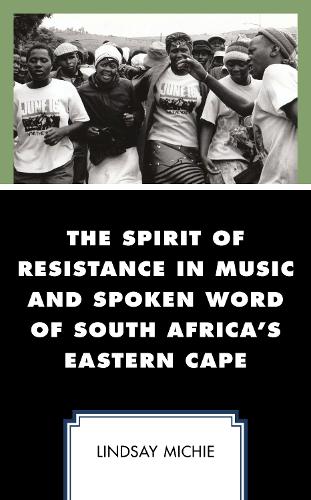
The Spirit of Resistance in Music and Spoken Word of South Africa's Eastern Cape
(Hardback)
Publishing Details
The Spirit of Resistance in Music and Spoken Word of South Africa's Eastern Cape
By (Author) Lindsay Michie
Bloomsbury Publishing PLC
Lexington Books
20th September 2021
United States
Classifications
Professional and Scholarly
Non Fiction
Theory of music and musicology
968.75004963985
Physical Properties
Hardback
298
Width 160mm, Height 228mm, Spine 28mm
635g
Description
From an array of prominent activists including Nelson Mandela and Steve Biko to renowned performers and oral poets such as Johnny Dyani and Samuel Mqhayi, the Eastern Cape region plays a unique role in the history of South African protest politics and creativity. The Spirit of Resistance in Music and Spoken Word of South Africa's Eastern Cape concentrates on the Eastern Cape's contribution to the larger narrative of the connection between creativity, mass movements, and the forging of a modern African identity and focuses largely on the amaXhosa population. Lindsay Michie explores Eastern Cape performance artists, activists, organizations, and movements that used inventive and historical means to raise awareness of their plight and brought pressure to bear on the authorities and systems that caused it, all the while exhibiting the depth, originality, and inspiration of their culture.
Reviews
The Spirit of Resistance in Music and Spoken Word of South Africa's Eastern Cape by Lindsay Michie brings orality studies into the twenty-first century. It shows the relevance of the musical and poetic genius of Eastern Cape South African performers. The book moves from the past, the impact of colonialism, the amaXhosa cattle-killing of 1857 through to apartheid and the era of democracy from 1994. It includes reference to the recent impact of COVID-19 on Eastern Cape performers creativity. At the heart of the book is how South Africas voice of protest is represented in the genres of the oral word musical and poetic. This is portrayed against a socio-political backdrop. This link between past and present is done with the full appreciation of the creative spirit and history of the Eastern Cape region. The book is indeed a spiritual journey that connects one with the language and culture of the amaXhosa, emphasizing the importance of creativity in the lived experiences of this community, both through a historical and contemporary lens. -- Russell H. Kaschula, University of the Western Cape
While there is no shortage of academic articles on protest, music, resistance, and the impact of Afro-American culture on South Africa, Lindsay Michie is almost uniquely qualified to synthesize the whole and fill in the gaps. Her experience teaching university history in Mthatha, precisely during the hectic years of South Africas transition, enables her to move seamlessly and effortlessly between the hymn of the prophet Ntsikana and the Hampton Male Quartet, from the nineteenth-century predecessors of the African National Congress to its twenty-first century successors in government. Even though unavoidably lacking in live music, her book is well livened up and enriched by well-chosen selections of praise-songs and other poetry that one is unlikely to find anywhere else. -- Jeff Peires, University of Fort Hare and author of The Dead Will Arise
Author Bio
Lindsay Michie is associate professor of history and co-chair of the Africana Studies Department at the University of Lynchburg.
